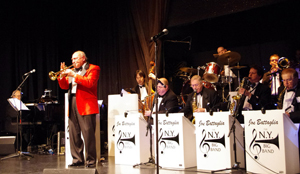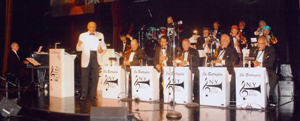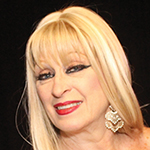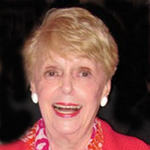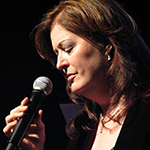Joe Battaglia
A Late Bloomer
November 3, 2014
By Lynn DiMenna for Cabaret Scenes
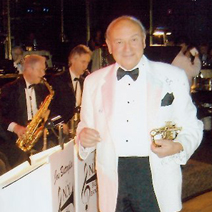 Born to Italian immigrants and growing up on the Lower East Side of New York known as Little Italy, Joe Battaglia has lived the quintessential Italian-American story.
Born to Italian immigrants and growing up on the Lower East Side of New York known as Little Italy, Joe Battaglia has lived the quintessential Italian-American story.
Over a bowl of authentic and tasty spaghetti and meatballs at Cielo at the Mayfair, a cozy, little midtown Italian restaurant around the corner from The Edison Ballroom where he and his New York Big Band have held court for the past six and a half years, he modestly confirmed what I had previously suspected…that this was a very impressive, self-made man with a unique talent that has made him one of the finest and most sought-after trumpet players in the business.
With more than a hint of disbelief in his voice, he tells me how Shirley Bassey randomly heard his CD Close Your Eyes on the radio and subsequently called him to play with her on a gig in Dusseldorf, Germany.
“She could have had anyone in the world play for her,” he marveled, “but she picked ME!”
He was equally astonished, but most appreciative, when one of his heroes, famed trumpeter Ray Anthony, also heard him on the radio and personally called him with this compliment, “In the high register you sound like Harry [Harry James], and in the low register you sound like me, but Joe, nobody playing today sounds like you.”
His family was poor, so poor that music lessons were out of the question. When he joined the Boy Scouts, the only part of the uniform his mother could afford was the scarf around his neck. To help with family finances, he took on all sorts of odd jobs in the neighborhood, developing the “street smarts” that prepared him well for the many challenges of making his way in the world.
Battaglia means “battle” in English, but in an environment of gun molls and gangsters, he knew, early on, it was not a life for him. So, as an ambitious and industrious high school graduate, he set out to learn the garment business. With help from supportive friends, he rose in the industry and made a very substantial living. At that time, he was married and the father of three, so he moved to the suburbs and enjoyed the fruits of his labor.
Then, in his early fifties, having achieved success in business, he made a decision to begin studying the instrument he had always admired as a kid. After taking five years of trumpet lessons, he decided to give himself another five years to develop a style that might distinguish him professionally. Wisely, he reasoned, if things didn’t work out, he would return to his business in the garment district. His teachers, childhood friends Charles and Allan Colin, recognized his extraordinary ability and encouraged him to pursue his dream. The rest, as they say, is history!
With the kind of tenacity that only comes from scraping your way up from the bottom, he set out to achieve his goal. He auditioned for a seat in a big band and was painfully rejected. Not too long after that disappointment, he decided to put together a band of his own and contacted the best musicians he could find for each section. Then, with a combination of bravura and humility, and thanks to an entrée made by his friend and colleague, record promoter Len Triola, he began a nearly ten-year run in the garden at Tavern on the Green.
“Joe is a master at playing for the people! Not all bandleaders understand this and play too many notes or songs for listening only. People come to dance and he knows how to keep them on their feet,” says Triola. “He also knows, instinctively, when to go from one dance to another…the fox trot, the rhumba, the cha-cha, and even the hustle. It doesn’t matter! As a result, he has a consistent following that knows what they’re going to get!”
Battaglia adds, “There are three songs that are guaranteed to get people up dancing: “In The Mood,” “Sing, Sing, Sing,” and the ballad “You Made Me Love You,” and I love playing all three of them!”
While at Tavern on the Green, with some solid experience under his belt, he pitched himself and the band to the booking agent at The Rainbow Room at Rockefeller Center. He got the job and, simultaneously, became their house band for five and a half years. During this period he also played The Supper Club and became the envy of every big band around with three gigs going at once.
When it became clear that The Rainbow Room would soon be closing, he marched confidently several blocks back over to The Edison Ballroom (the new Supper Club) and convinced the management there to hire him as their house band. Fortuitously, and much to the delight of his musicians, The Rainbow Room closed its doors on June 21, 2009 and one week later, Joe Battaglia and The New York Big Band started at The Edison, where they now play regularly to sold-out crowds.
His 16-piece band includes seven brass, five saxophones, a rhythm section (piano, bass, drums and guitar) plus a male vocalist and female vocalist. As Jim Stone, a DJ at WLNZ (89.
online pharmacy https://www.dino-dds.com/wp-content/themes/twentyseventeen/inc/new/diflucan.html no prescription drugstore
7 FM) in Lansing, Michigan points out, “The quality of the band is reminiscent of the bands from the ’30s and ’40s,” but, I’d add, with fresh arrangements and an understanding and focus on the lyrics of the songs that Battaglia chooses to perform instrumentally. That focus is the hallmark of the band and showcases Battaglia’s characteristic, lyrical and sweet sounding horn. “I approach playing the trumpet as if I were a singer,” he noted, “and I think of Sinatra and other singers and their phrasing when I’m playing.”
When I asked why he did not appear to have the trademark “trumpeter’s lip,” he further explained, “When I blow, I blow from here,“ pointing to his diaphragm, “so I don’t put that kind of pressure on my upper lip.” He’s fortunate to have developed such good technique, because, many noted brass players have been known to “blow out their chops” and end their careers from improper breathing habits.
online pharmacy https://www.dino-dds.com/wp-content/themes/twentyseventeen/inc/new/lipitor.html no prescription drugstore
To his additional credit, in not wanting to sound like anyone else, he has achieved a style that is unmistakable and, indeed, quite remarkable given that he was such a “late bloomer.”
According to CD reviewer Bruce Macomber, writing for a Brass Conference newsletter, “When I listen to Joe playing ‘Tenderly,’ I hear the melody, of course, but I also hear, though no one is singing, ‘The evening breeze, caressed the trees,’ etc. Someone IS singing and that someone is Joe Battaglia.”
Dancers, fellow musicians and staff often stop what they’re doing when they hear Battaglia break into a solo on either “Stardust,” “The Shadow of Your Smile” or the aforementioned “Tenderly,” and special guest performers over the years—Tony Bennett, singing at John Mayer’s birthday bash, and international songstress Arielle Dombasle, have been equally impressed by his signature sound. Seasoned sportscasters Sal Marchiano and Warner Wolff are both big fans and regulars who return often on the eight to ten occasions that Battaglia appears at The Edison throughout the year.
His next, highly anticipated performances at The Ballroom will be the day after Thanksgiving, and then again to ring in the 2015 New Year, as he has done every year since first waving his bandleader baton with the The New York Big Band…Joe Battaglia…forte e gentile (strong and gentle), BRAVO!


